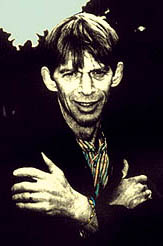
|
| |
You can read Ulli Freer's poem "Fragmento" | |
| |
1 Polemic | |
| |
filling with waste land residuum
 Ulli Freer Syntax, in the broadest sense of the word, must be taken into consideration (more of this later) but so must sound. An alliterative linkage tenaciously declares that, away from the semantic level, these words belong together: lift / shaft; mulled blood; whisper policy; spindle flesh. There is even visual punning: blood oozes. It is partly this ancient device of stress-alliteration (as witnessed in Freer's performance style) which enables the text to be both more disruptive than the arrangement commonly called juxtaposition, and also less disruptive. It has a smoothness that blends the links in with the materials. (Collage always seem to imply a torn quality, a violence.) Notice how the alliterative pairs overlap with the list of above of adjective-noun combinations to confirm the doubleness. | |
| |
3 Theories withdrawal, division, distension, (when . . . two sensations draw apart, release themselves, but so as now to be brought together by the light, the air, or the void that sinks between them or into them, like a wedge that is at once so dense and so light that it extends in every direction as the distance grows, ad forms a bloc that needs no support.Deleuze and Guattari have sculpture as their model here (in music they associate this third variety with theme rather than the simple air or resonating motif), but I believe that the lineation, syntax, and sound in Blvd.s operate aurally as this dense-light wedge to compose a new bloc of sensation. Andrew Duncan once developed a theory of the pulse (a word which appears throughout Blvd.s), partly in relation to Freer's textual and performance practice. 'One should think of absolute stress, dominating an empty space. You have to generate enough silence for your stress peaks to be heard.' (See Fragmente 4) This seems close to the Deleuzoguattarian concept, and accurate to the experience of witnessing Freer read. Also, in the text: praxisThe isolated 'praxis' holds its own against the similarly spaced 'noise', and is the model of (poetic and/or political) activity. The ambiguous last line offers a turn on or a tuning in as much as a solution. The key is not one for Jope to unlock the text. It doesn't unlock; it speaks. We key in for praxis. In an update of the influential 'Minor Literature' chapter of Kafka, Deleuze and Guattari comment specifically on literature. 'The writer uses words, but by creating a syntax that makes them pass into sensation that makes the standard language stammer, tremble, cry or even sing.' This deforming passage into sensation is achieved by undoing 'the triple organisation of perceptions, affections and opinions, in order to substitute a monument composed of percepts, affects and blocs of sensation'. The means for this seem to be syntax but, as Duncan observed not altogether uncritically of 'pulse poetry', 'Syntax is replaced by juxtaposition'. In Blvd.s juxtaposition is syntax. 4 Thematics Blvd. Such an odd abbreviation for an English eye (and its even odder plural: Blvd.s). American or French? A resonant word, politically: the blvds of Paris were designed by Haussmann to minimise the opportunities for insurrection, yet they have been the scenes of uprisings, the cobblestone happiness of 1968, for example. Only one section relates to the title directly: baited sidewalks blockadesThis is a passage of contrasts and of identity in difference, carried by the syntax of juxtaposition, or of creative linkage. The 'ugh' of a (cinematic) punch eye-rhymes with the 'hugs' that are emotionally its opposite, however 'tedious'. 'Baited . . . blockades . . . cordoned off . . . stranded' suggest alienation and entrapment, rather than the object of the linkage, 'alleviation' and 'hope'. 'Wordless police' are 'dubbed', both speechless and spoken for, at once. 'Dubbed to be free' sounds suspiciously like somebody else is rhetorically doing our talking for us, despite the subject matter. (Remember, Thatcher crusaded to empower us.) The 'spidery gabardines' (another unusual adjective-noun combination) connote surveillance and traps, again by that police (in ununiformed uniforms). The Arachno-detectives. The concluding 'rumble pulses' combination is oxymoronic: a rumble is a constant, a pulse is an interval, pulses a series of them. Like the histories of the blvd.s of Paris (along which traffic both rumbles and pulses) the text links external control with the desire for liberation, the pulse of purposeful 'praxis' juxtaposed with purposeless interference: 'pulse embedded in random/noise'. Pulses released from random noise (refrains, in Deleuze and Guattari's terms) form monuments for the future. Pulses as links in a chain, not of communication (the traditional opposite of noise) but of creation. March 1995 Pages 362-380, January 1996
Afterword, mid-1999: | |
J A C K E T # 8
Contents page |
|